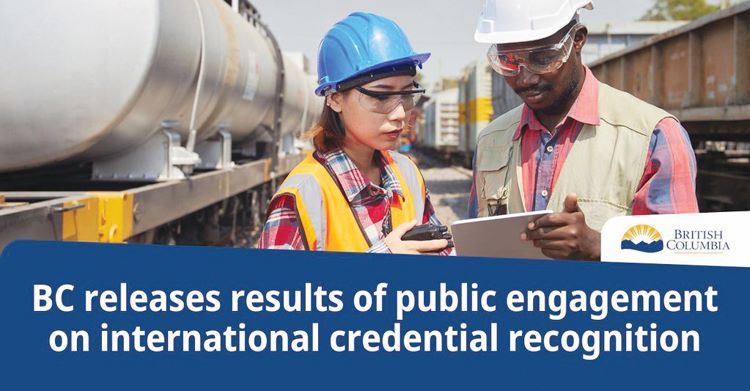VICTORIA – More than 1,450 people gave feedback through wide–ranging public engagement on the
international credential–recognition progress.
international credential–recognition progress.
Feedback from the Province’s engagement is available online and will be used to inform future
legislation to improve credential recognition for newcomers to B.C.
In spring 2023, the Province asked internationally trained professionals, educational institutions,
immigrant–serving organizations, business associations, health–care associations, regulatory authorities
and members of the public for their feedback about international credential recognition through a series
of roundtables and an online survey.
“We’ve heard from regulators, post–secondary institutions and internationally trained professionals that
the system isn’t working,” said Andrew Mercier, Minister of State for Workforce Development. “This is a
question of fairness and about making sure that internationally trained professions have the supports
they need to succeed and practise in B.C.”
More than 1,450 British Columbians participated in this public engagement through roundtables and an
online survey about how to improve the credential recognition process and remove unnecessary
barriers for newcomers to Canada.
“Mosaic would like to express its appreciation to the Ministry of Post–Secondary Education and Future
Skills and the Minister of State for Workforce Development Andrew Mercier and his team for taking the
time to hear directly from the many immigrant professionals we work with, whose direct experience
with the barriers to credential recognition will inform improvements to these processes,” said David Lee,
director of employment at Mosaic, an immigrant–serving organization. “We look forward to how we can
support newcomers to B.C. in connecting to employment in a way that takes full advantage of their skills
and experience.”
The “what we heard” report identified eight themes for improvement:
* streamlining complex processes and shortening timelines;
* improving the accessibility, consistency and transparency of information about the licensure process
and requirements;
* exploring alternative pathways for credential recognition;
* exploring more flexible approaches to demonstrate language proficiency;
* introducing performance standards for data and reporting;
* increasing financial and other supports for internationally trained professionals and regulatory
authorities;
*improving co–ordination between government and regulatory authorities at the provincial and federal
levels; and
* strengthening collaboration between regulatory authorities, educational institutions, employers and
immigrant–serving organizations to support licensure and integration.
Feedback gathered from the public engagement will be used to help streamline the international
credential–recognition process and work toward new legislation. (news.gov.bc.ca)
* strengthening collaboration between regulatory authorities, educational institutions, employers and
immigrant–serving organizations to support licensure and integration.
Feedback gathered from the public engagement will be used to help streamline the international
credential–recognition process and work toward new legislation. (news.gov.bc.ca)
